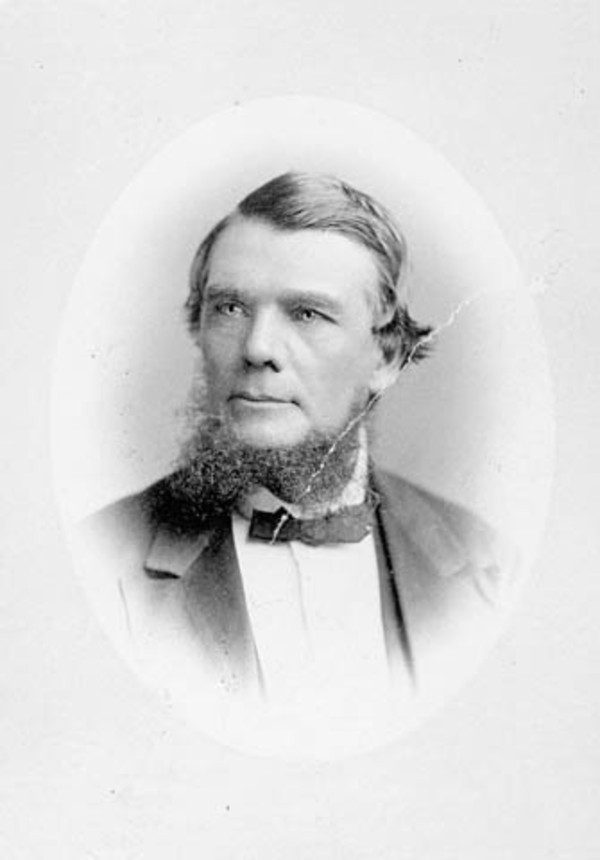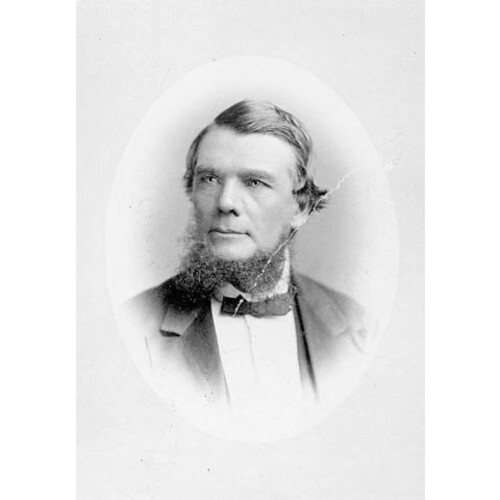GOW, PETER, businessman, politician, and officeholder; b. 20 Nov. 1818 at Johnstone (Strathclyde), Scotland, second son of John Gow (a descendant of Niel Gow, a well-known 18th-century Perthshire violinist) and Agnes Ferguson; m. 29 Dec. 1857 Mary Maxwell Smith of Kirkcudbright (Dumfries and Galloway), Scotland, and they had nine sons and three daughters; d. 24 Feb. 1886 in Guelph, Ont.
After education at a private school, Peter Gow worked with his father, a shoe manufacturer. Immigrating to Canada West in 1842 to improve his position, he spent two years at Brockville and then settled in Guelph. He built woollen and oatmeal mills on the Speed River to serve the developing area, but leather was his chief interest. By 1853 he had a tannery “in full operation” and a store stocked with boots and shoes which he sold “cheap for cash” or exchanged for country produce. Gow remained in business until 1868 when he leased his factories and retired in comfortable circumstances.
Gow was active in municipal affairs in Guelph as a member of the committee founding a mechanics’ institute in 1850, as an elected school trustee in 1852, and as a town councillor in 1855. He accompanied the reeve to Toronto in December 1855 to obtain incorporation and establish ward divisions for Guelph. He was elected alderman for the south ward, deputy reeve, and representative to the county council in 1856. The next year Gow became reeve and in 1858 was again elected alderman, but he lost the mayoralty contest of 1859. Re-election as alderman for the south ward in 1863, 1864, and 1865 was followed by two terms as mayor in 1866 and 1867, during which time the town of 6,000 persons erected its first street lights and observed its 40th birthday.
Elected for Wellington South to the first Ontario Legislative Assembly in 1867, Gow firmly opposed John Sandfield Macdonald*’s coalition government, condemning the “mawkish cry” of “no politics” and declaring that “the only correct government was a party government.” Although he spoke little in the legislature, dedicated attention to the needs of his constituents won him re-election by acclamation in 1871 and 1875, while political loyalty earned him the office of provincial secretary in December 1871 in the new liberal government of Edward Blake*. He was replaced in that post by Timothy Blair Pardee on 25 Oct. 1872 when Oliver Mowat* succeeded Blake as premier. Conservatives complained that “poor Peter Gow,” the “only honest man in the late Ministry,” had been cast aside “like an old glove.” They later suggested that his departure from the cabinet was eased by transferring the site of the proposed agricultural college (later the Ontario Agricultural College) from Mimico to Guelph in 1873. In the assembly, however, Gow claimed that he had opposed the move until convinced of the unsuitability of the former Mimico site; he also insisted that his retirement from the cabinet was an entirely unrelated “personal matter.” The premier may have preferred the more influential Pardee as provincial secretary, but there is no evidence of a bargain between Mowat and Gow. The latter probably had asked, as the Globe reported, for relief from responsibility because of health problems which eventually caused him to resign his seat in 1876. He then accepted the less demanding shrievalty of Wellington County. He continued as sheriff until his death.
True to his Scottish heritage, Gow was a Presbyterian, and a curling club president. He was a charter member in 1868 and a manager of Chalmer’s Church. Charles Clarke* described him as a splendid organizer and effective worker, “essentially a man of the people.” Gow contributed to the commercial prosperity and social progress of Guelph in the mid 19th century. He helped revive party government in Ontario after confederation and establish the long Liberal administration beginning in 1871.
Ont., Legislative Library, Newspaper Hansard, 1867–77 (mfm. at AO). Globe, 31 Dec. 1867, 26 Oct. 1872, 11 March 1873. The annals of the town of Guelph, 1827–1877, comp. C. A. Burrows (Guelph, Ont., 1877), 63–158. Canadian biog. dict., I: 752–55. CPC, 1876: 387. DNB (entry for Niel Gow). Charles Clarke, Sixty years in Upper Canada, with autobiographical recollections (Toronto, 1908), 159, 180–81.
Cite This Article
A. Margaret Evans, “GOW, PETER,” in Dictionary of Canadian Biography, vol. 11, University of Toronto/Université Laval, 2003–, accessed March 31, 2025, https://www.biographi.ca/en/bio/gow_peter_11E.html.
The citation above shows the format for footnotes and endnotes according to the Chicago manual of style (16th edition). Information to be used in other citation formats:
| Permalink: | https://www.biographi.ca/en/bio/gow_peter_11E.html |
| Author of Article: | A. Margaret Evans |
| Title of Article: | GOW, PETER |
| Publication Name: | Dictionary of Canadian Biography, vol. 11 |
| Publisher: | University of Toronto/Université Laval |
| Year of revision: | 1982 |
| Access Date: | March 31, 2025 |




